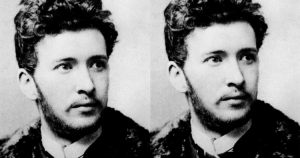Sudip Bose at The American Scholar:
 The title of Ferruccio Busoni’s 1907 manifesto Sketch of a New Aesthetic of Music might suggest that the Italian pianist-composer would be looking to the future, yet many of its philosophical passages find him lingering in the past. Writing out “of convictions long held and slowly matured” (he was 41 at the time), Busoni extolled the virtues of the Baroque and classical ages, Bach and Beethoven being the exemplars—in “spirit and emotion they will probably remain unexcelled.” Busoni’s embrace of the past, however, was no rejection of modernity. “Among both ‘modern’ and ‘old’ works,” he wrote, “we find good and bad, genuine and spurious. There is nothing properly modern—only things which have come into being earlier or later; longer in bloom, or sooner withered. The Modern and the Old have always been.” Past and present, tradition and experiment—all could happily coexist in art. Thus, in more or less the same breath, Busoni could praise the elegance of Mozartian classicism while pondering some avant-garde technique, such as microtonal harmony. What mattered most of all were spirit and emotion; “he who mounts to their uttermost heights,” the musician wrote, “will always tower above the crowd.”
The title of Ferruccio Busoni’s 1907 manifesto Sketch of a New Aesthetic of Music might suggest that the Italian pianist-composer would be looking to the future, yet many of its philosophical passages find him lingering in the past. Writing out “of convictions long held and slowly matured” (he was 41 at the time), Busoni extolled the virtues of the Baroque and classical ages, Bach and Beethoven being the exemplars—in “spirit and emotion they will probably remain unexcelled.” Busoni’s embrace of the past, however, was no rejection of modernity. “Among both ‘modern’ and ‘old’ works,” he wrote, “we find good and bad, genuine and spurious. There is nothing properly modern—only things which have come into being earlier or later; longer in bloom, or sooner withered. The Modern and the Old have always been.” Past and present, tradition and experiment—all could happily coexist in art. Thus, in more or less the same breath, Busoni could praise the elegance of Mozartian classicism while pondering some avant-garde technique, such as microtonal harmony. What mattered most of all were spirit and emotion; “he who mounts to their uttermost heights,” the musician wrote, “will always tower above the crowd.”
more here.
